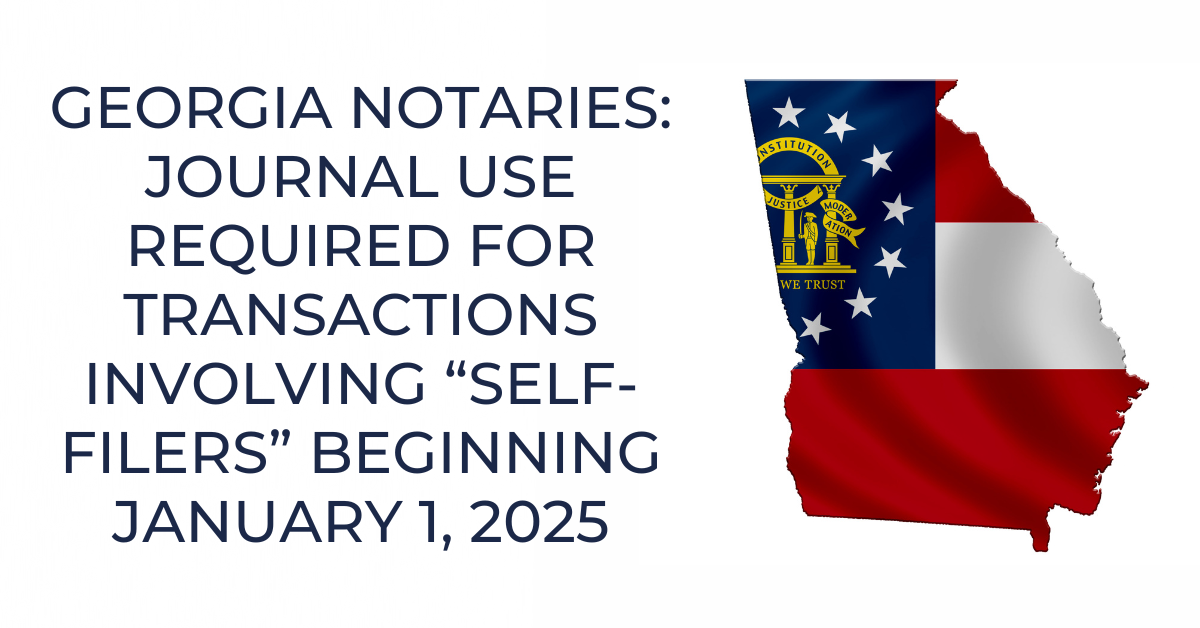Notary Public Underwriters Blog
Georgia Notaries: Journal Use Required for Transactions Involving “Self-Filers” Beginning January 1, 2025
- Details
- Published: July 18, 2024

Effective January 1, 2025, every Georgia notary public who performs a notarial act at the request of a “self-filer” must document the notarial act in a “written” (paper) or electronic journal.
The requirement was passed by Georgia’s General Assembly in late March 2024 and signed by the Governor on May 2, 2024.
The key to understanding applicability of Georgia’s freshly enacted journal requirement is recognizing when a person or entity requesting a notarial act is a “self-filer.”
Under the new law, the term “self-filer” means:
- any person who is a party to these instruments listed in Official Code of Georgia Annotated (OCGA) §44-2-2(b)(1): deeds, mortgages, liens, maps or plats relating to real estate in the county; and state tax executions and state tax execution renewals as provided for in Article 2, Chapter, Title 48 (OCGA);
but who is not:
- An insurance agent or a representative of an insurance agency licensed to sell title insurance in Georgia;
- An attorney licensed to practice law in Georgia or a representative of an attorney licensed to practice law in Georgia;
- Licensed under Chapter 40, Title 43, Official Code of Georgia Annotated (OCGA; Georgia’s law dealing with real estate brokers and salespersons); An agent of a bank or credit union with federal deposit insurance or an affiliate thereof;
- An agent of a licensed or exempt mortgage lender pursuant to OCGA Article 13, Chapter 1, Title 7 (Georgia laws dealing with financial institutions and licensing of mortgage lenders and mortgage brokers);
- An agent of a servicer as such term is defined in 12 C.F.R. Section 1024.2 (federal regulations dealing with real estate settlement procedures);
- A public official or employee of a federal, state, or local government or a department, agency, board, commission, or authority thereof performing their official duties; or
- A professional land surveyor licensed under Georgia Code, Chapter 15 of Title 43 and in good standing with the Georgia Professional Engineers and Land Surveyors Board.
Additionally, the new law specifies that a notary public’s written or electronic journal entries regarding self-filers must include: the name of the self-filer; the self-filer’s address; the self-filer’s telephone number; the date, time, and location of notarization; the type of government issued photo identification documents presented by the self-filer (unless the identity of the self-filer was confirmed based on personal knowledge); information elements of such identification document(s) including any identifying number; the self-filer’s signature; and the type of document presented for notarization.
The new law also requires that on and after January 1, 2025, certain specified instruments (deeds, mortgages, liens as provided for by law, maps or plats relating to real estate in a county, and state tax executions and state tax execution renewals provided-for in OCGA Article 2 of Chapter 3, Title 48) presented by a self-filer to a Georgia Superior Court Clerk for recording must be submitted using electronic filing. Current law already requires each Georgia Superior Court Clerk to provide a public computer terminal through which a person may access the Clerks’ electronic filing system.
Georgia Superior Court Clerks’ Cooperative Authority (GSCCCA), the state entity that provides administrative support and project development services to each Superior Court Clerk, is required to adopt the necessary rules and regulations to implement certain provisions of the new law. Those provisions include the journal requirement and a notary public training requirement, applicable to new notary applicants and those renewing an existing commission.
Related Article(s)
Can I Notarize When the Person Has No ID?
What to Do When the Notary Certificate Is Missing?
What Should I Do When There's No Room for My Notary Stamp?
Can I Notarize a Document That Is Already Signed?
Can a Notary Change a Document’s Date?
How to Notarize Signatures on Handwritten Documents
What to Do When Names Don’t Match on the ID and Document
Is a Notarization Valid Without the Notary Stamp on the Document?
